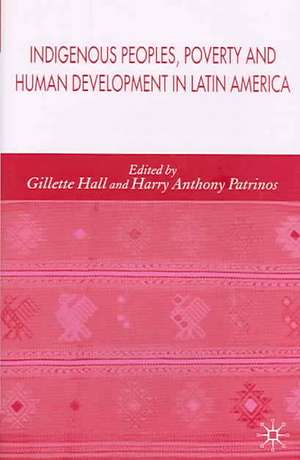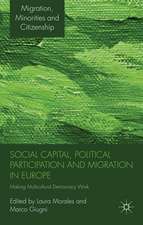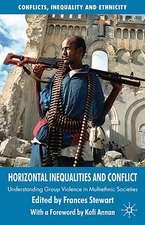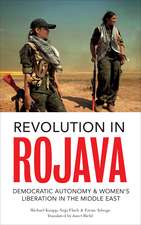Indigenous Peoples, Poverty and Human Development in Latin America
Autor Gillette Hall Editat de H. Patrinosen Limba Engleză Hardback – 13 dec 2005
| Toate formatele și edițiile | Preț | Express |
|---|---|---|
| Paperback (1) | 834.52 lei 6-8 săpt. | |
| Palgrave Macmillan UK – 13 dec 2005 | 834.52 lei 6-8 săpt. | |
| Hardback (1) | 644.30 lei 6-8 săpt. | |
| Palgrave Macmillan UK – 13 dec 2005 | 644.30 lei 6-8 săpt. |
Preț: 644.30 lei
Preț vechi: 758.01 lei
-15% Nou
Puncte Express: 966
Preț estimativ în valută:
123.28€ • 129.07$ • 102.01£
123.28€ • 129.07$ • 102.01£
Carte tipărită la comandă
Livrare economică 05-19 aprilie
Preluare comenzi: 021 569.72.76
Specificații
ISBN-13: 9781403999382
ISBN-10: 1403999384
Pagini: 308
Ilustrații: XX, 308 p. 7 illus.
Dimensiuni: 140 x 216 x 23 mm
Greutate: 0.53 kg
Ediția:2006
Editura: Palgrave Macmillan UK
Colecția Palgrave Macmillan
Locul publicării:London, United Kingdom
ISBN-10: 1403999384
Pagini: 308
Ilustrații: XX, 308 p. 7 illus.
Dimensiuni: 140 x 216 x 23 mm
Greutate: 0.53 kg
Ediția:2006
Editura: Palgrave Macmillan UK
Colecția Palgrave Macmillan
Locul publicării:London, United Kingdom
Cuprins
Overview: The Indigenous Peoples Decade in Latin America Estimating the Number of Indigenous People in Latin America Bolivia Ecuador Guatemala Mexico Peru Key Messages and an Agenda for Action
Recenzii
'For any individual or organization seriously interested in the socio-economic status of indigenous peoples in Latin America, this book will serve as the supreme authoritative source of information for the next ten years. Working with the best available data on five Latin American countries, the authors have assembled a truly insightful documentation and analysis of significant trends in the political, economic, and social forces affecting Latin American indigenous populations.' - Ronald L. Oaxaca, University of Arizona, USA
'The book in hand is a manifestation that the Bank is doing something substantive to address one of the major roots of poverty in Latin America.' - George Psacharopoulos, formerly with the World Bank
'Indigenous Peoples, Poverty and Human Development in Latin America: 1994 - 2004 offers a sophisticated major advance in our understanding of the economic and social conditions of indigenous peoples. Their poverty is shown to be related to skill formation, and this is shown to be related to issues of language, access to and quality of schooling, health, political weakness, limited social protection, and discrimination. Sensible and realistic policy recommendations flow from the analysis. This volume should have a major impact on policy, as well as serve as a template for similar analyses of indigenous peoples in other regions, whether developed or less developed.' - Barry R. Chiswick, UIC Distinguished Professor, Research Professor andHead, Department of Economics, University of Illinois, USA
'The book in hand is a manifestation that the Bank is doing something substantive to address one of the major roots of poverty in Latin America.' - George Psacharopoulos, formerly with the World Bank
'Indigenous Peoples, Poverty and Human Development in Latin America: 1994 - 2004 offers a sophisticated major advance in our understanding of the economic and social conditions of indigenous peoples. Their poverty is shown to be related to skill formation, and this is shown to be related to issues of language, access to and quality of schooling, health, political weakness, limited social protection, and discrimination. Sensible and realistic policy recommendations flow from the analysis. This volume should have a major impact on policy, as well as serve as a template for similar analyses of indigenous peoples in other regions, whether developed or less developed.' - Barry R. Chiswick, UIC Distinguished Professor, Research Professor andHead, Department of Economics, University of Illinois, USA
Notă biografică
GILLETTE HALL is an economist at the World Bank. Raised in Latin America, she developed an early interest in issues of poverty, and later faced these challenges first hand as a volunteer in the small rural village of Nepena, Peru. Her work at the Bank focuses on helping partner governments development successful policies for poverty reduction. She holds an undergraduate degree from the Georgetown University School of Foreign Service and a Ph.D in Economics from the University of Cambridge, UK. She has taught at the University of Oregon, in her hometown of Eugene, Oregon, and at the Johns Hopkins School for Advanced International Studies in Washington, DC. She has published journal articles and papers on poverty and development in Latin America.
HARRY ANTHONY PATRINOS is Senior Education Economist at the World Bank. He manages several projects in the Latin America region and specializes in the economics of education. He is one of the main authors of the report, Lifelong Learning in the Global Knowledge Economy. He has many publications in the academic and policy literature and is co-author of the books: The Policy Analysis of Child Labor: A Comparative Study, Decentralization of Education: Demand-Side Financing, and Indigenous People and Poverty in Latin America: An Empirical Analysis (with George Psacharopoulos). He has also worked in Africa, Asia, Europe, the Middle East and North America and has previously worked as an economist at the Economic Council of Canada. He has received a doctorate from the University of Sussex.
HARRY ANTHONY PATRINOS is Senior Education Economist at the World Bank. He manages several projects in the Latin America region and specializes in the economics of education. He is one of the main authors of the report, Lifelong Learning in the Global Knowledge Economy. He has many publications in the academic and policy literature and is co-author of the books: The Policy Analysis of Child Labor: A Comparative Study, Decentralization of Education: Demand-Side Financing, and Indigenous People and Poverty in Latin America: An Empirical Analysis (with George Psacharopoulos). He has also worked in Africa, Asia, Europe, the Middle East and North America and has previously worked as an economist at the Economic Council of Canada. He has received a doctorate from the University of Sussex.













